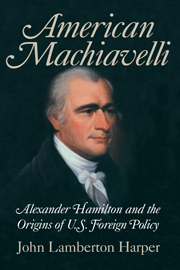Book contents
- Frontmatter
- Contents
- List of Illustrations
- Acknowledgments
- Miscellaneous Frontmatter
- Introduction
- PART I THE COMING OF NECESSITY
- PART II BATTLE LINES ARE DRAWN
- 3 At Washington’s Side Again, 1789
- 4 Hamilton versus the Virginians, 1789–1791
- 5 The Nootka Sound Crisis, Part One: The Morris Mission
- 6 Nootka Sound, Part Two: The View from New York
- 7 Liaisons Dangereuses, 1791–1792
- PART III SEIZING THE HELM
- PART IV INFORMAL ADVISER TO THE PRINCE
- PART V A PRINCE IN HIS OWN RIGHT?
- PART VI THE LESSER OF EVILS
- Conclusion: Hamilton Then and Now
- Notes
- Bibliography
- Index
5 - The Nootka Sound Crisis, Part One: The Morris Mission
Published online by Cambridge University Press: 05 April 2013
- Frontmatter
- Contents
- List of Illustrations
- Acknowledgments
- Miscellaneous Frontmatter
- Introduction
- PART I THE COMING OF NECESSITY
- PART II BATTLE LINES ARE DRAWN
- 3 At Washington’s Side Again, 1789
- 4 Hamilton versus the Virginians, 1789–1791
- 5 The Nootka Sound Crisis, Part One: The Morris Mission
- 6 Nootka Sound, Part Two: The View from New York
- 7 Liaisons Dangereuses, 1791–1792
- PART III SEIZING THE HELM
- PART IV INFORMAL ADVISER TO THE PRINCE
- PART V A PRINCE IN HIS OWN RIGHT?
- PART VI THE LESSER OF EVILS
- Conclusion: Hamilton Then and Now
- Notes
- Bibliography
- Index
Summary
Introduction
The United States in 1790 was not the first young, geopolitically vulnerable republic to face the possibility that its security and honor might be seriously at risk in a situation that it was practically powerless to affect. Flush from his subjugation of the Romagna around 1500, Cesare Borgia sent a message to Florence requesting that his forces be allowed to cross the republic’s territory unhindered on their way to Rome. Machiavelli used this incident to illustrate the thesis of a chapter of the Discourses called “Weak republics are irresolute and don’t know how to decide.”
He first recounted an episode in which the Romans, unable because of a plague to come to the defense of a unarmed, dependent city against an attacking enemy, and faced with the certainty that the city would arm itself even if Rome disapproved, had made the gesture of consenting. In so doing, argued Machiavelli, the Romans had preserved a modicum of reputation and honor under circumstances of necessità. Similarly pressed by necessity, no one in Florence recommended that formal consent be given to Borgia to do something that he was certain to do regardless of Florentine approval or disapproval. Unfortunately, in other words, “the Roman way wasn’t followed: because with the Duke [Borgia] heavily armed and the Florentines unequipped to prevent his passage, it was much more to their honor, that he appear to pass with their consent than by force.” When he subsequently marched without permission, Borgia not only humiliated Florence; in his anger he also inflicted physical destruction that he probably otherwise would have avoided. The Florentines’ indecisiveness and lack of realism had cost them once again.
- Type
- Chapter
- Information
- American MachiavelliAlexander Hamilton and the Origins of U.S. Foreign Policy, pp. 65 - 73Publisher: Cambridge University PressPrint publication year: 2004



